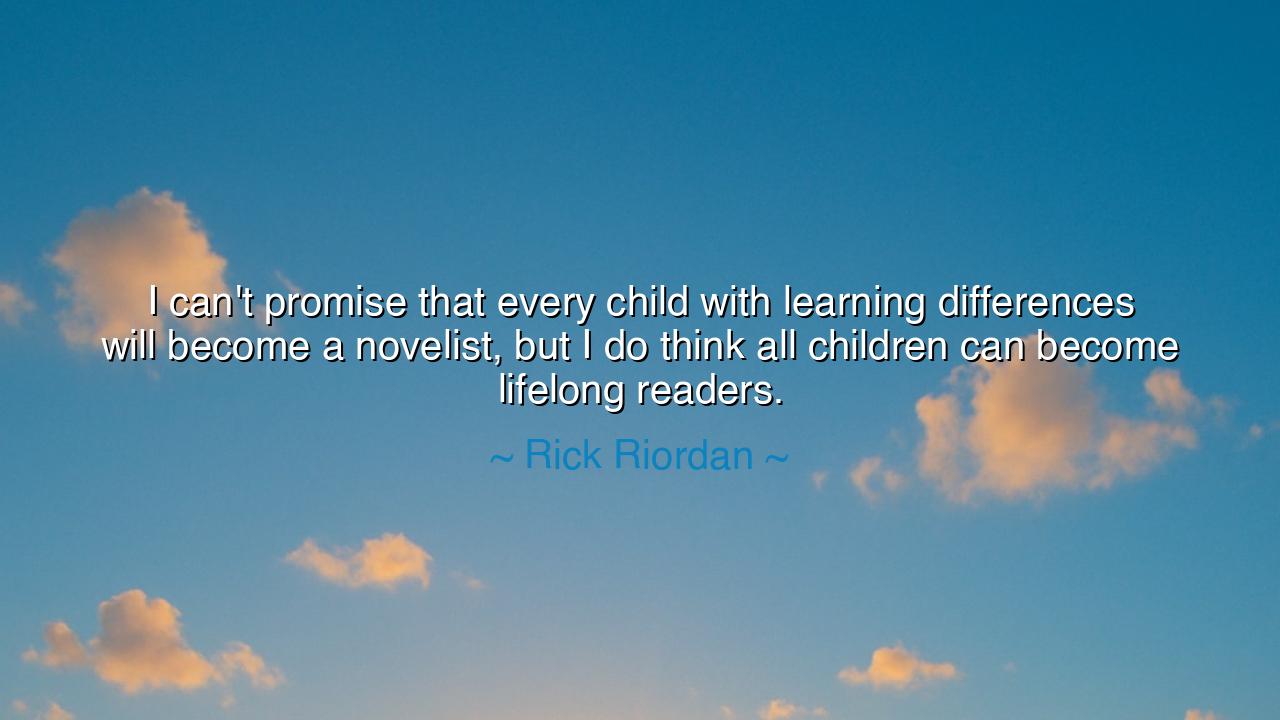
I can't promise that every child with learning differences will
I can't promise that every child with learning differences will become a novelist, but I do think all children can become lifelong readers.






In the gentle wisdom of a teacher and storyteller, Rick Riordan once said, “I can’t promise that every child with learning differences will become a novelist, but I do think all children can become lifelong readers.” These words rise not from theory, but from compassion — from a man who has seen the light of imagination awaken in children once silenced by frustration. It is a statement both humble and profound, affirming that the act of reading is not reserved for the gifted few, but a birthright of every human spirit that seeks understanding and wonder.
Riordan’s words come from a place of deep empathy. Before he became the celebrated author of Percy Jackson and the Olympians, he was a schoolteacher, guiding students who struggled to learn in traditional ways. He saw how learning differences — dyslexia, ADHD, and others — often led children to believe they were less capable, less intelligent, less worthy. Yet he also witnessed something extraordinary: when these same children found stories that spoke to them, the barriers fell away. Through books, they rediscovered themselves — their curiosity, their courage, their capacity to dream. Thus, Riordan’s belief was forged not in the lecture hall, but in the classroom of life.
To say that not every child will become a novelist is to recognize the diversity of gifts that life bestows. Creativity manifests in many forms — in art, in science, in kindness, in resilience. But to say that every child can become a lifelong reader is to proclaim faith in the human soul’s desire for connection. Reading is not merely decoding symbols on a page; it is communion — between mind and mind, age and age, world and world. The gift of reading is the gift of entering another’s dream and awakening with new eyes.
History, too, bears witness to this truth. Consider Helen Keller, born deaf and blind, yet through the patient teaching of Anne Sullivan, she discovered the miracle of words — that each sign traced upon her hand was a bridge to thought and meaning. From that moment, Keller became not merely literate, but luminous; through reading, she touched minds across continents. Her story reveals what Riordan means: that reading is not limited by ability or circumstance, but by opportunity and encouragement.
In ancient times, the poets and philosophers understood reading as sacred work. The Greeks called it paideia — the cultivation of the soul through learning. The Egyptians inscribed wisdom upon temple walls, believing that to read was to speak with eternity. And so too must we, in our own age, restore that reverence. For when a child learns to read, the world itself becomes a text — every sunrise, a sentence; every life, a story.
Riordan’s message carries a call to all parents, teachers, and creators: make reading a refuge, not a test. Let books be offered not as chores, but as treasures. For the child who reads out of joy will one day think deeply, feel profoundly, and live meaningfully. A reader’s heart becomes vast — filled with empathy, with memory, with imagination. And from that heart, every noble action flows.
The lesson, then, is this: while not all are destined to write the great novels of the world, all are capable of living the great stories within them. To nurture reading is to nurture humanity itself — the capacity to listen, to dream, to grow.
Thus, Rick Riordan’s words are a torch passed to every generation: “I can’t promise that every child with learning differences will become a novelist, but I do think all children can become lifelong readers.” Let us carry that flame into every home and every classroom. For when a child learns to read, even the quietest voice gains power; even the smallest soul begins to soar.






AAdministratorAdministrator
Welcome, honored guests. Please leave a comment, we will respond soon